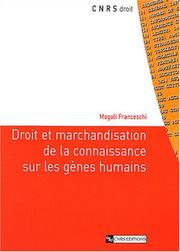| Listing 1 - 9 of 9 |
Sort by
|
Book

ISBN: 9782247081745 2247081746 Year: 2008 Publisher: Paris : Dalloz,
Abstract | Keywords | Export | Availability | Bookmark
 Loading...
Loading...Choose an application
- Reference Manager
- EndNote
- RefWorks (Direct export to RefWorks)
La génétique est une science qui avance à pas de géants et influence de plus en plus nos perceptions des problèmes de société et de santé. Selon le philosophe-médecin Hank ten Have, « La culture occidentale serait profondément entraînée dans un processus de généticisation » qui touche de nombreuses sphères de la vie humaine. Comment cette nouvelle « donne » affecte-t-elle les questions de responsabilité ? Comment dessiner les contours de cette notion ? Le glissement de la génétique vers la « généticisation » entraîne-t-il une déresponsabilisation ou même la destruction des valeurs démocratiques ? Les normes juridiques et les encadrements éthiques actuels sont-ils suffisants pour encadrer les progrès de la génétique ? Comment une société peut-elle faire face à la « généticisation » ? Les contributions du présent ouvrage sont issues du septième séminaire d'experts de l'IIREB et émanent d'experts franco-québécois de disciplines variées, juristes, médecins, philosophes, historiens, sociologues, éthiciens, anthropologues qui ont confronté leurs points de vue sur cette question. Puisse cet ouvrage collectif contribuer, tant pour les citoyens, les pouvoirs publics et les chercheurs à enrichir leur réflexion !
Medical law --- Social ethics --- Professional ethics. Deontology --- Tort and negligence --- Genetics --- Liability (Law) --- Bioethics --- Human genetics --- Responsabilité (Droit) --- Bioéthique --- Génétique humaine --- Congresses --- Law and legislation --- Congrès --- Droit --- Responsabilité (Droit) --- Bioéthique --- Génétique humaine --- Congrès --- Human genetics - Law and legislation - Congresses --- Human genetics - Law and legislation - France - Congresses --- Human genetics - Law and legislation - Canada - Congresses --- Responsabilité (droit) --- Dépistage génétique --- Personnel médical --- Protection de l'information (informatique) --- Déontologie

ISBN: 9780415444330 9780203939390 0415444330 9781134066636 9781134066674 9781134066681 9780415574471 0415574471 Year: 2008 Publisher: New York: Routledge,
Abstract | Keywords | Export | Availability | Bookmark
 Loading...
Loading...Choose an application
- Reference Manager
- EndNote
- RefWorks (Direct export to RefWorks)
Human genetics --- Génétique humaine --- Law and legislation --- Philosophy --- Droit --- Philosophie --- Genetics --- Heredity, Human --- Human biology --- Physical anthropology --- Law and biology --- Human genetics - Law and legislation --- Human genetics - Philosophy
Book
ISBN: 9782711013845 2711013847 Year: 2010 Volume: 33 Publisher: Paris : Litec,
Abstract | Keywords | Export | Availability | Bookmark
 Loading...
Loading...Choose an application
- Reference Manager
- EndNote
- RefWorks (Direct export to RefWorks)
Globalization --- Culture --- Sports --- Water --- Greenhouse gases --- Mondialisation --- Eau --- Gaz à effet de serre --- Economic aspects --- Law and legislation --- Aspect économique --- Droit --- Human genetics --- Genetic engineering --- Gaz à effet de serre --- Aspect économique --- Economic aspects. --- Human genetics - Law and legislation - France - Congresses --- Genetic engineering - Law and legislation - France - Congresses --- Droit international économique --- Marchandisation --- Réification
Book
ISBN: 0367138468 9780367138462 Year: 2018 Publisher: London : Routledge,
Abstract | Keywords | Export | Availability | Bookmark
 Loading...
Loading...Choose an application
- Reference Manager
- EndNote
- RefWorks (Direct export to RefWorks)
"Technologies like CRISPR and gene drives are ushering in a new era of genetic engineering, wherein the technical means to modify DNA are cheaper, faster, more accurate, more widely accessible, and with more far-reaching effects than ever before. These cutting-edge technologies raise legal, ethical, cultural, and ecological questions that are so broad and consequential for both human and other-than-human life that they can be difficult to grasp. What is clear, however, is that the power to directly alter not just a singular form of life but also the genetics of entire species and thus the composition of ecosystems is currently both inadequately regulated and undertheorized. In [this book] ... scholars from law, the life sciences, philosophy, environmental studies, science and technology studies, animal health, and religious studies examine what is at stake with these new biotechnologies for life and law, both human and beyond."--
Human genetics --- Genetic recombination. --- Genetic regulation. --- Mutation (Biology). --- Law and legislation. --- Mutation (Biology) --- Gene Editing --- Human Genetics --- Recombination, Genetic --- Mutation --- legislation & jurisprudence. --- ethics. --- Genetic recombination --- Genetic regulation --- Law and legislation --- legislation & jurisprudence --- ethics --- Human genetics - Law and legislation --- Gene Editing - legislation & jurisprudence --- Human Genetics - legislation & jurisprudence --- Recombination, Genetic - ethics --- Mutation - ethics
Book
ISBN: 8847055962 884702031X 9786613708809 8847020328 1280798416 Year: 2012 Publisher: Milano : Springer Milan : Imprint: Springer,
Abstract | Keywords | Export | Availability | Bookmark
 Loading...
Loading...Choose an application
- Reference Manager
- EndNote
- RefWorks (Direct export to RefWorks)
Biotechnology is a recognized research area that has increasingly advanced into new technologies and modern practices raising several legal, ethical and regulatory issues. The revolutionary speed of biotech innovations has had a significant impact on the protection of the rights of the individual. Fundamental rights provide a framework within which the justification of limitations and restrictions to biotechnology innovations and research results have to be assessed. The legal regulation of scientific research and scientific investigations impact more and more directly on the freedom of research and therapies as well as on the broad diffusion of knowledge. Closely related is also the debated question of the technological manipulation of life and the boundary of scientific knowledge with regard to the topical question of genetic invention patents and their side effects on access to scientific information and health care opportunities. Drawing on expertise from different disciplines, the volume comprises invited papers and plenary presentations given at the conference entitled “Biotech Innovations & Fundamental Rights” that took place on Januray 20-21 2011 at the Department of Juridical Sciences of the University of Ferrara. Each contribution covers a different aspect of the legal and scientific issues involved in regulation of biotechnology. In particular the focus of attention has been given to genetic research, genetic data, freedom of scientific research in genetics and biotech patents.
Biotechnology -- Patents. --- Biotechnology -- Research -- Law and legislation. --- Human genetics -- Law and legislation. --- Biotechnology --- Human genetics --- Law, Politics & Government --- Law, General & Comparative --- Law and legislation --- Research --- Law and legislation. --- Law. --- Human genetics. --- Biochemistry. --- Constitutional law. --- Constitutional Law. --- Human Genetics. --- Biochemistry, general. --- Law and biology --- Biopiracy --- Biological chemistry --- Chemical composition of organisms --- Organisms --- Physiological chemistry --- Biology --- Chemistry --- Medical sciences --- Genetics --- Heredity, Human --- Human biology --- Physical anthropology --- Constitutional law --- Constitutional limitations --- Constitutionalism --- Constitutions --- Limitations, Constitutional --- Public law --- Administrative law --- Composition --- Interpretation and construction

ISBN: 9004150536 9786612396786 1282396781 9047417682 9789004150539 Year: 2006 Volume: 66 Publisher: Leiden ; Boston : Martinus Nijhoff Publishers,
Abstract | Keywords | Export | Availability | Bookmark
 Loading...
Loading...Choose an application
- Reference Manager
- EndNote
- RefWorks (Direct export to RefWorks)
Who owns our DNA? The intuitive answer to this question is readily apparent: you own your own DNA. However, since Watson and Crick discovered its molecular structure, our DNA has gradually evolved from the Secret of Life to a potentially lucrative Commodity . This development has triggered conflicting perspectives as to who holds legal title to our blood, genes and related health data. Rather than focusing on a specific property claim in isolation, this book is the first to provide an integrated analysis of the merits of each of these perspectives. While the United Nations have proclaimed human DNA as the Heritage of Humanity, industry claims it to be patentable subject matter. Whereas populations whose DNA is used in national biobanks claim their DNA as their National Property, individual patients increasingly stand up for their Personal Property Rights in their samples. Meanwhile academic researchers claim their collections of biological materials as their Academic Property. Taking a case and context driven approach and backing up traditional legal analysis with historical analogies, web-surveys and practical experience, Jasper Bovenberg provides counter-intuitive, provocative and practical answers and recommendations for such controversial issues as how to share the benefits of DNA research, whether or not to recognize personal property rights in bodily material and access to biomedical datasets in academia. This book will interest not only lawyers and researchers, but also universities, funding agencies, industry and policymakers worldwide. It is also written to inform patients, their relatives, doctors and anyone else with an interest in a dilemma that is as universal as our DNA.
Human genetics --- DNA data banks --- Human gene mapping --- DNA --- Property. --- Law and legislation. --- Patents. --- Property --- Law and legislation --- Patents --- Economics --- Possession (Law) --- Things (Law) --- Wealth --- Law and biology --- Medical laws and legislation --- Deoxyribonucleic acid --- Desoxyribonucleic acid --- Thymonucleic acid --- TNA (Nucleic acid) --- Deoxyribose --- Nucleic acids --- Genes --- Right of property. --- Ownership of property --- Private ownership of property, Right of --- Private property, Right of --- Property, Right of --- Property rights --- Right of private ownership of property --- Right of private property --- Right of property --- Right to property --- Civil rights --- Primitive property --- Human genetics - Law and legislation --- DNA data banks - Law and legislation --- Human gene mapping - Law and legislation --- DNA - Patents --- Droit médical
Book
ISBN: 2717839585 9782717839586 Year: 2000 Publisher: Paris : Economica - anthropos,
Abstract | Keywords | Export | Availability | Bookmark
 Loading...
Loading...Choose an application
- Reference Manager
- EndNote
- RefWorks (Direct export to RefWorks)
Human genetics --- Law and legislation. --- Moral and ethical aspects. --- -Human genetics --- -#GBIB:CBMER --- 17.023.33 --- 575.11 --- 61.001.5 --- menselijk genoom --- genetisch onderzoek --- menswaardigheid (waardigheid) --- mensenrechten (rechten van de mens) --- Genetics --- Heredity, Human --- Human biology --- Physical anthropology --- Law and legislation --- Moral and ethical aspects --- génome humain --- recherche génétique --- dignité humaine --- droits de l'homme --- #GBIB:CBMER --- Moral and religious aspects --- Law and biology --- Human genetics - Law and legislation. --- Human genetics - Moral and ethical aspects. --- BIOETHIQUE --- DROITS DE L'HOMME --- CLONAGE --- PROTECTION DU CORPS --- PROTECTION --- VIE PRIVEE

ISBN: 2271062004 9782271062000 Year: 2004 Publisher: Paris CNRS
Abstract | Keywords | Export | Availability | Bookmark
 Loading...
Loading...Choose an application
- Reference Manager
- EndNote
- RefWorks (Direct export to RefWorks)
Cet ouvrage porte sur les transformations du droit de la propriété intellectuelle intervenus au cours des vingt dernières années dans le contexte de développement rapide des recherches sur les gènes et de quête d’innovations biotechnologiques appliquées à la médecine. L’apparition des brevets sur les gènes humains témoigne d’un puissant mouvement de marchandisation des connaissances. Celui-ci a pour base un déplacement important des équilibres entre science et technologie, entre le système de recherche public fonctionnant selon un régime de « science ouverte », et la recherche industrielle et privée fonctionnant selon un régime de réservation et d’appropriation des connaissances. La forme privilégiée prise par ce processus est le développement d’un secteur « mixte » : un marché de la recherche de base sur lequel opèrent start-ups et gestionnaires de capital risque.
Medical law --- Economic law --- Professional ethics. Deontology --- Genetics --- Human genetics --- Law and legislation --- Research --- Economic aspects --- 316.422 --- 575 --- 174.4 --- 17.023.33 --- genetica (genen) --- genomica --- genetisch onderzoek --- commercialisering van het menselijk lichaam (orgaanhandel) --- geneesmiddel (geneesmiddelenindustrie, farmaceutische industrie) --- patent (octrooi, patentrecht, octrooirecht, biopatent) --- genetisch patent --- wetenschappelijk onderzoek --- socio-economische aspecten (socio-economische factoren) --- organisatie (organisatorische aspecten) --- Innovatie. Modernisering --- General genetics. General cytogenetics. Immunogenetics. Evolution. Speciation. Phylogeny --- Bedrijfsethiek. Zakenmoraal --- Biologische doeleinden. Bio-ethiek; bioethiek. Übermensch. Medische deontologie --- génétique (gènes) --- génomique --- recherche génétique --- commercialisation du corps humain (commerce d'organes) --- médicament (industrie pharmaceutique) --- brevet (brevetabilité, brevetabilité biologique, droit de brevet, droit des brevets, brevetabilité du vivant) --- brevet génétique --- recherche scientifique --- aspects socio-économiques (facteurs socio-économiques) --- organisation (aspects organisationnels) --- 17.023.33 Biologische doeleinden. Bio-ethiek; bioethiek. Übermensch. Medische deontologie --- 174.4 Bedrijfsethiek. Zakenmoraal --- 575 General genetics. General cytogenetics. Immunogenetics. Evolution. Speciation. Phylogeny --- 316.422 Innovatie. Modernisering --- Heredity, Human --- Human biology --- Physical anthropology --- Law and biology --- Research&delete& --- Human genetics - Law and legislation --- Human genetics - Law and legislation - France --- Human genetics - Research - Economic aspects --- Human genetics - Research - Economic aspects - France
Book
ISBN: 2731402156 9782731402155 Year: 2000 Publisher: Aix-en-Provence Presses universitaires d'Aix-Marseille
Abstract | Keywords | Export | Availability | Bookmark
 Loading...
Loading...Choose an application
- Reference Manager
- EndNote
- RefWorks (Direct export to RefWorks)
1. Le droit face au pouvoir d'individualisation des données génériques.- Titre I. le renouvellemnt du processus juridique d'identification par les données génétiques.- Titre II. La nécessaire reconnaissance de droist subjectifs sur les données génétiques.-2. Le droit face au pouvoir de prédiction des données génétiques.- Titre I. la diversité des attitudes juridiques au regard de la prédiction du devenir de la personne.- Titre II. la recherche d'un consensus international au regard de la prédiction du devenir de l'espèce humaine.
Human genetics --- DNA fingerprinting --- Personality (Law) --- Law and legislation --- Gezondheidsrecht --- Genetica --- genetische databank (genetische informatie) --- genetische diagnostiek (diagnose) --- genetische vingerafdruk (DNA-identificatie) --- recht (wetgeving, rechtspraak, rechtsbeginselen, juridische aspecten, aansprakelijkheid) --- 575 --- 34 --- -Human genetics --- -Personality (Law) --- -575 --- Genetics --- Heredity, Human --- Human biology --- Physical anthropology --- DNA fingerprints --- DNA identification --- DNA profiles --- DNA profiling --- Genetic fingerprinting --- Genetic fingerprints --- Forensic genetics --- Identification --- Droit sanitaire --- Génétique --- banque d'information génétique (base de données génétiques, information génétique) --- diagnostic génétique --- empreinte génétique --- droit (aspects juridiques, législation, jurisprudence, principes de droit, responsabilité) --- General genetics. General cytogenetics. Immunogenetics. Evolution. Speciation. Phylogeny --- Rechtswetenschappen. --- -Technique --- -Gezondheidsrecht --- 34 Rechtswetenschappen. --- 575 General genetics. General cytogenetics. Immunogenetics. Evolution. Speciation. Phylogeny --- -DNA fingerprinting --- Rechtswetenschappen --- Technique --- 34 Rechtswetenschappen --- 34 Law. Jurisprudence --- Law. Jurisprudence --- Human genetics - Law and legislation - France. --- DNA fingerprinting - France. --- Personality (Law) - France.
| Listing 1 - 9 of 9 |
Sort by
|

 Search
Search Feedback
Feedback About
About Help
Help News
News